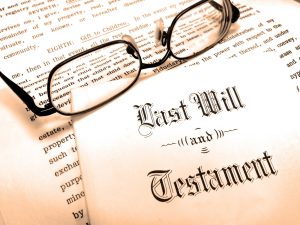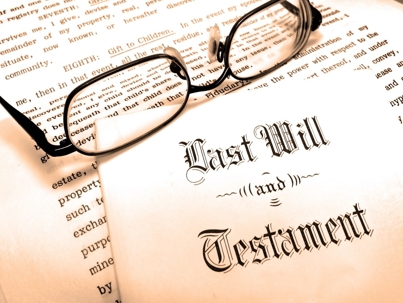
A Last Will and Testament (will) is an official, legal document that allows you to declare who has the legal right to manage your estate and inherit your property after you pass away. Although none of us wants to think about our own death, writing a will is an important action that will allow the division of your property to go as smoothly as possible. Constructing a valid will can minimize family disputes and disagreements about your property after you are gone. Here are some important items to consider when writing a will. If you are considering creating an estate plan that may (or may not) include a will, contact the experienced estate planning attorneys at Johnson Law Group. Our dedicated attorneys can help you understand the estate planning documents you need to ensure your wishes are carried out in the event of your death or incapacitation. Contact us at (720) 744-3513 or through Text-to-Chat (720) 744-3513 today.
Legal Terms and Your Will
When you begin planning your estate, you may run into unfamiliar legal words, these following are some common words and terminology used in connection with an estate plan and a will.
- Beneficiary: someone named in a will or other legal document as one who has inherited money or property.
- Bequeath: to leave property to another person upon your death.
- Decedent: the person who has passed away.
- Executor: the person who has been appointed to manage the affairs of a dead person’s estate.
- Intangible property: assets that cannot be grasped, such as part ownership in a business or stock certificates.
- Personal property: all types of assets except real property.
- Personal representative: another term for the executor of an estate.
- Probate: the legal process of dispensing a deceased person’s property to the beneficiaries.
- Real property: real estate; land and things that are permanently attached to the land, such as a house.
- Testator: the person who wrote the will and signed it.
Components of a Will
Every will must be executed correctly or will not be considered valid, therefore, you should make sure that you execute your will according to all state laws. Additionally, although a will can be as unique as the person writing it, there are some basic actions that a will accomplishes, including the following:
Names an Executor
A will names an executor, or personal representative to manage the estate of the decedent (the person that passed away). The executor is called this because he or she “executes” the wishes expressly stated in the will.
Distributes Assets and Property
A will announces who will inherit your assets, real estate, and personal property. Your estate may include large items such as boats and houses, and small, sentimental items such as photos and jewelry. All of your property will be placed in a separate estate trust and go through the probate process, which will ensure that all of your creditors are paid and that the distribution of all of your assets goes to the correct beneficiaries according to your will.
Appoint a Guardian For Minor Children
A will can declare who will become the guardian of your minor children. You do not need permission before appointing someone as a guardian, but not everyone can fulfill the role of guardian, so consider including more than one person as a choice of guardian for your minor children.
Dying Without a Will
If you die and have not created a will, your estate will be settled according to the specific laws of the state of Colorado. This is called intestate succession, and it is most likely that your property will be given to your closest living relatives. A judge will appoint an administrator of the estate. If you wish to have the final say on what happens to your estate after you pass away, visit with an attorney, who can prepare a valid will for you. If you create a will yourself, bring it to an attorney at Johnson Law Group to ensure that the will is legally sound.
Should You Consider Writing A Last Will and Testament Yourself Without an Attorney?
The drafting and execution of an estate plan is a complicated legal task. While it may be possible to fill out do-it-yourself legal documents online, it is not likely that a person without estate planning experience will know whether those documents completely cover the eventualities that they anticipate will occur. Additionally, an estate plan is a full and comprehensive cohesion of multiple legal documents that specifically address the needs and requests of the person creating it. An estate plan can encompass directions for guardianship, the passing of assets, business succession plans, health care directives, pet guardianship, the donation of assets to charity and much more. To ensure that your legal and financial rights remain protected according to your specific wishes, consider contacting an experienced estate planning attorney today.
Contact an Experienced Estate Planning Attorney Today
If you are beginning an estate plan or updating an existing will, an experienced attorney can help you navigate the often complex process. Visiting with a qualified attorney can ensure that your wishes regarding your property and assets are honored. Additionally, an attorney can advise you regarding other types of estate documents such as a living trust which may better suit your needs. Contact an experienced estate planning attorney today at Johnson Law Group at (720) 744-3513 or through Text-to-Chat (720) 744-3513 to schedule a free consultation.
The post Writing a Last Will And Testament appeared first on Best Family Law Attorney in Colorado - Johnsonlgroup.





